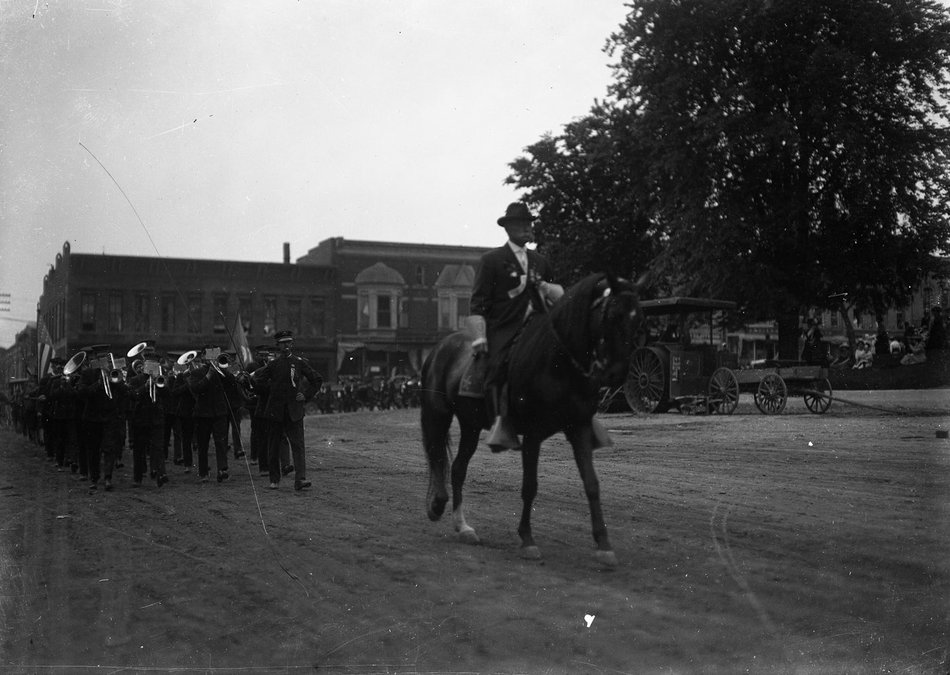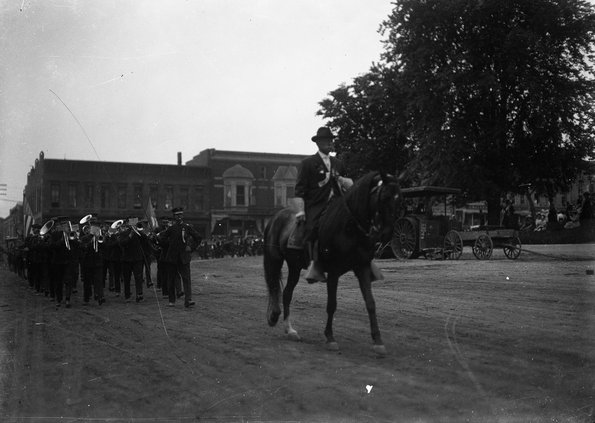Early in November 1919 President Woodrow Wilson proclaimed that November 11 would be the first commemoration of Armistice Day, one year after the fighting of World War I had ceased. The newly formed Glen Zilmer post of the American Legion asked on November 4 that November 11 be proclaimed a holiday in Monroe. They asked that “the national colors be conspicuously displayed from business houses and private residences in honor of the anniversary of the day when hostilities in the great war ceased and peace came to the world.” Copies of that resolution were handed to Mayor John T. Etter and filed with the city clerk.
A program with plenty of “pep” had already been arranged by November 7. There was to be a concert at the armory. There were be two big dances, one at the Turner Hall with Miller’s novelty, orchestra; the other was to be at the armory. In addition, a football game was scheduled at the fairgrounds between Monroe and Elkhorn high schools. The Monroe Hussar band would play during the game.
Tickets for the football game and dances were on sale at Ruf’s, Benkert & Stauffacher, Kohli clothing store, Clark Drug, Trukenbrod’s, and the Movie Inn. Tickets for the football game were $0.50 and $1 for the dance.
Mayor Etter issued a proclamation urging all citizens to make that Tuesday “a half holiday, beginning at 11 a.m.; that all business places and homes display the stars and stripes, and that all cooperate with Glen Zilmer post American Legion in observing Armistice Day.” Business houses and stores were closed in the afternoon. The three banks, Citizens, First National, and Commercial & Savings, closed at 11:00. The city schools celebrated by closing in the afternoon after having Armistice Day exercises in the morning.
A short article in the Monroe Evening Times on November 10 reminded residents of the day. “Tomorrow is Armistice Day — display the national colors. Let Old Glory float in the breeze from public buildings, business houses, and private homes. Not alone as an expression of triumph in a great victory won but in memory of the great joy which filled the world one year ago tomorrow when the war ended and the boys came out of the trenches.”
The blowing of whistles a few minutes before 11:00 on the morning of November 11 heralded the holiday. Following the signal, the city observed a minute of silence in honor of the dead soldiers. The one-minute tribute was also observed in the school rooms. In some of the buildings, the pupils sang the Star-Spangled Banner. Schools were dismissed at noon. Stores and businesses closed, only to open again at 3:00.
The Elkhorn Warriors arrived in “motor cars” for the football game and were escorted to the field by the Monroe Hussar band, which also played at intervals during the game. Nothing was shared in the newspaper the following day about the score of the game, but five members of the American Legion, dressed in uniforms of the Army, Navy, and Marines, “carried on a Red Cross Drive where they collected about $46.
In honor of the day, flags began to make their appearance in all parts of the city early in the morning. Quite a number of visitors from other parts of the county arrived to spend the holiday.
The evening at the armory would include selections from Ray Bast’s Orchestra interspersed by brief addresses and vocal selections. Rev. N. E. McLaughlin, from the Universalist Church, acted as chairman. The initial prayer was offered by Rev. Gunderman, followed by a vocal solo by Helen Donner. A memorial address was given by Rev. Krug with a vocal solo, “The Boys Who Won’t Come Back,” by Maud E. Wenger accompanied by Edna V. Leuenberger.
A reading, “Your Flag and My Flag,” was given by Edna Vivette Leuenberger, with orchestral accompaniment. Another vocal solo, “Home Again,” was given by Rev. McLaughlin who was accompanied by Charles Bolender. An address, “The American Legion,” was given by W. H. McGrath followed by selections from the orchestra before the audience sang the Star Spangled Banner.
An article in the Times shared what had happened in Monroe a year earlier. The news that Germany had signed the armistice terms was received by the Times at 2:18 by a telephone call from the international News Service. The Times extra was off the press at 4 o’clock and put on the street at 5:00. “Every factory whistle and church bell in the city let go at 5 o’clock when the public was aroused from its slumber and informed of the glorious news.”
It continued, “Nothing but an earthquake could have shaken Monroe people out of their beds as did the peace celebration early Monday morning. Hundreds of people swarmed to the square within an hour after The Times made its appearance. The lid was off the city with young and old celebrating alike. Gray haired men and women paraded the streets with horns, yelling at the top of their voices. Younger folks fired volleys into the air and endeavored to make as much noise as possible with drums, pans and horns. The schools, which were to convene that day for the first time following an enforced vacation because of the influenza epidemic, were dismissed to give the children a chance to join the jollification.”
Two impromptu parades were held that year. The first one was organized early in the morning and lead by the Hussar band followed by hundreds of school children carrying flags. They were followed by automobiles and trucks jammed with men, women and children, who shouted as they paraded the streets. A second parade was formed in the afternoon. Most of the businesses were closed during the day to give citizens the chance to celebrate “the greatest day in the history of our country.”
— Matt Figi is a Monroe resident and a local historian. His column will appear periodically on Saturdays in the Times. He can be reached at mfigi48@tds.net or at 608-325-6503.


